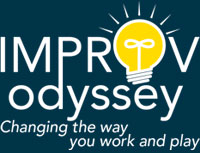Space is not nothing – it is EVERYTHING!
[Space]… It is our medium. It is the material we use for interaction with others and our environment. It is our support and our lifeline to reality. You are either in the Space or you are in your head. read more →
Commentary on Spolin’s Tips and Pointers: Part 1
How we do something is the process of doing (right now!). Pre-planning “How” makes process impossible and so becomes resistance to the focus of the exercise, and no “explosion” or spontaneity can take place, making any change or alterations in the student-actor impossible. True improvisation re-shapes and alters the student-actor through the act of improvising itself. Penetration into the focus, connection, and a live relation with fellow players result in a change, alteration, or new understanding for one or the other or both. In time, during the solving of the acting problem the student becomes aware of being acted upon and of acting, thereby creating process and change within his or her stage life. The intuition gained remains with the player in everyday life, for whenever a circuit is opened for anyone, so to speak, it is usable everywhere. read more →
Just Be Yourself
We ape, we mimic, we mock. We act. — Laurence Olivier Have you ever walked into an interview or an audition and the interviewer, in an effort to relax you, tells you “just be yourself”? And rather than helping you, you only get more butterflies in your stomach? Your mind races. “What does that mean.. read more →
Improvisation is an ideal way to practice the art of Crisis Management
Transformation: The Value of Emergency in Play or Creating Healthy Crisis “In the middle of difficulty lies opportunity.” ~Albert Einstein How do you begin to effect transformation? What sparks change? Answer – crisis. What happens during a crisis is critical for change. …reform is usually possible only once a sense of crisis takes hold. Good leaders.. read more →
Play is Essential to Life & Work
I got this link from a colleague, Rob Adler. Again, here is someone else who sees what we need as a society and how important play is. This argues for the same paradigm shift Improv Odyssey advocates. There are people out there who can lead you back to that essential ingredient that not only relieves.. read more →
The Difference between Spolin Games and Popular Improv
There is a profundity in Spolin’s work that is hard to capture and commoditize. It cannot be learned intellectually, but must be experienced firsthand to really be understood. There are only a handful of teachers carrying on her tradition, myself being one of them.
Improvisation began with Spolin. But other popular forms have emerged as more popular and have swept the world. I will try to explain the reason for this. read more →
Improv – The Long and the Short of It
Short Form and Long Form are the same The distinction between short form and long form is a development that stems from the going awry or misunderstanding the focus of a game. These terms get bandied about as if they are two separate disciplines. They are not. Spolin used these games as exercises to help.. read more →
The Seduction of the Teacher
The Trap “Students who regard an instructor highly will tend to adopt that instructor’s attitudes, orientations, and values. This is a seductive phenomenon because it can lead to the ego-enhancement of instructors who have not reached full psychological maturity. This ‘ego-stroking’ can then motivate instructor behaviors which do not have the personal development of participants.. read more →
Beginner’s Mind
Beginner’s Mind “In the beginner’s mind there are many possibilities, but in the expert’s there are few…” Zen master Shunryu Suzuki Beginner’s mind is experiencing a thing for the first time. “Firsts” are always memorable. Improvisation is a constant search for ‘first times’. I once did a wonderful improv scene in Viola’s class using the.. read more →
A Question of Evaluating Students
I recently got a letter from a teacher who uses Spolin Games in the classroom. She asked an interesting question: …Here’s my question: what theatre game would you recommend I use in evaluating the ability level or strength of a 4-6 grader performing improvisation? In other words, which game might let me know which student.. read more →







